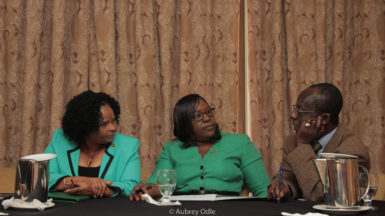Amid high numbers of deaths, the Ministry of Public Health yesterday launched a $1.6b IDB-funded maternal and child health (MCH) improvement project.
A press release from the ministry said that Public Health Minister Volda Lawrence plugged sustained local and international support to guarantee the success of the five-year US$8M Inter-American Development Bank (IDB) financing.
Lawrence said she is worried about Guyana’s continued high rates of maternal and infant mortality and said reversing those patterns cannot be the sole responsibility of her Ministry.

“The health sector, you and I know, is faced with a myriad of challenges at all levels and in varying degrees with our maternal and infant mortality appearing high on that list; our maternal mortality rates estimated at 121/100,000 live births and infant mortality rates estimated at 22/1000 live births,” Lawrence told participants at the Grand Coastal Inn, Le Ressouvenir, East Coast Demerara, according to the release.
Despite support from overseas partners, Lawrence said that the health sector challenges have remained daunting, highlighting the MCH sector.
“At present, there exist countless constraints that militate against the effective operations of this unit and result in the demise of our mothers and infants. This phenomenon, I want to reiterate, undermines our national health priorities and depletes our national human resource assets,” the Minister said.
Last week, 30-year-old Jillian Jacobi died in neighbouring Brazil, where she had been taken for emergency treatment after experiencing complications when a doctor stationed at the Lethem Regional Hospital tried to remove a dead foetus from her body.
According to Junior Public Health Minister, Dr Karen Cummings, based on information received, Jacobi was in a village a short distance away from the hospital when she went into labour. However, due to the unavailability of a vehicle, there was a delay in getting the woman to the hospital.
It was further reported that by the time the woman managed to get to the hospital, her baby had died, resulting in her having to undergo a procedure to remove the remains of the foetus.
However, due to the resulting complications, efforts were subsequently made to have Jacobi moved to Brazil for emergency treatment, where she eventually died.
The release said that the project will support an in-depth revision of all guidelines, protocols, and strategies related to the health of women of reproductive age, pregnancy, delivery, emergency care, and postpartum challenges. The programme also envisages a focus on specific needs of adolescents, men and indigenous peoples.
The release added that the project also intends to provide quality reproductive, maternal and neonatal care and strengthen the supply chain for contraceptive methods and drugs and blood products.
None of the interventions of the health improvement programme must “trample on the cultural beliefs and practices” of beneficiaries Lawrence cautioned.





